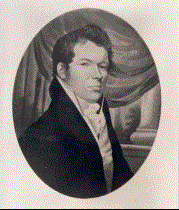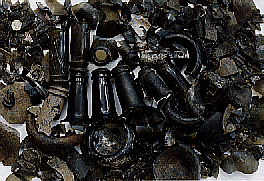Home
About This Project
Social Impacts
Economic Impacts
Sources and Links
|
|
|
ECONOMIC IMPACTS
Historical evidence, in general, suggests the use of spirits as a currency degraded the economy of the colony of Sydney.
If labour was paid for by spirits which were then drunk, the producers would not make a monetary profit. This in turn would degrade the economy of the colony, as essentially the currency was being drunk by the settlers. In 1820, 100,000 gallons of spirits were sold to a population of less than 20,000 adults, and this doesn't include the amounts of spirits that were smuggled in (Day 1992, pg 118).
Using spirits as a currency also encouraged a monopoly to form. Those who controlled the import of spirits could then control the provision of and prices of those spirits. Officers would board the ships and sell the cargo (including spirits) to the colony at extortionate prices (Ellis 1955, pg 155). |

John Macarthur, one of the leading men in the monopoly of the spirit trade. Picure from National Archives of Australia |

Collection of broken wine and spirit bottles from Norfolk Island. Picture from Archaeology British Colonial Australia |
Using archaeological evidence might be able to give us more information, or correct information that biased historical sources provide. Looking at evidence for the expansion of Sydney, for example, might suggest that the rum trade was not as effective in degrading the economy as other sources suggest. Sydney grew over the period, and would not have been as able to do so if the economy was in serious trouble. Evidence from Norfolk Island (which was controlled by the government in Sydney at that time) has shown that most of the many wine, spirit and gin bottles found there were from Britain or the Netherlands (Varman, 1997). This provides more evidence that the import of liquor did play a large part in the economy, and so supports the historical record. |
Related Links
 William Bligh's Second Mutiny - with some information on the monopoly. William Bligh's Second Mutiny - with some information on the monopoly.
 Archaeology British Colonial Australia - with evidence of spirit bottles on Norfolk Island. Archaeology British Colonial Australia - with evidence of spirit bottles on Norfolk Island.
 Windsor's "Rum Smugglers' Tunnel" - a lot of historical information about the rum trade about a third of the way down the page. Windsor's "Rum Smugglers' Tunnel" - a lot of historical information about the rum trade about a third of the way down the page.
 The Sydney Guide - with a small amount of information on the use of rum as a currency in their 'Early Years of Settlement' section. The Sydney Guide - with a small amount of information on the use of rum as a currency in their 'Early Years of Settlement' section.
|
|